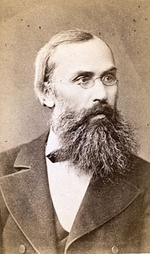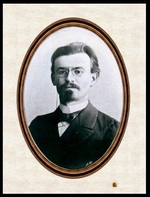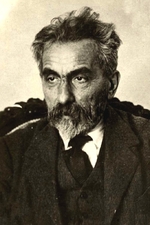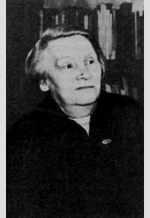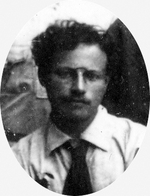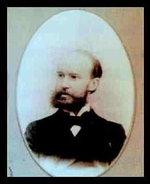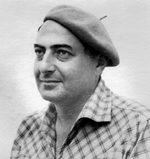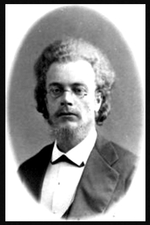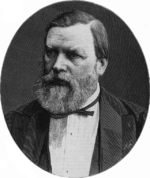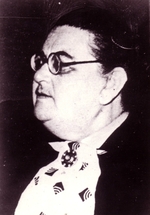Articles
Maksimov Sergey (1831–1901)
Maksimov Sergey (1831–1901) – ethnographer, folklorist, writer.
In 1850, after the Kostroma gymnasium, he enrolled to the Medical Faculty of the Moscow University. In 1852, he moved to St. Petersburg and transferred to the Medical and Surgery Academy.
In 1855, he made his first ethnographical travel through the Central Russia.
Later, he traveled to various regions of the country on the order of the Navy Ministry and compiled reports, wrote articles and fiction stories, which were published in numerous magazines: ‘Morskoy sbornik’ (Navy Collection), ‘Biblioteka dlya chteniya’ (Library for reading), ‘Syn Otechestva’ (Son of the Motherland), ‘Otechestvennye zapiski’ (Native Notes); later they were gathered in several books.
Read More
Malitsky Nickolay (1881–1938)
Malitsky Nickolay (1881–1938) – archeologist, art historian, medievalist, specialist in Byzantine studies.
In 1905, he graduated from the St. Petersburg Spiritual Academy; in 1909 – the Historical and Philological Faculty of the St. Petersburg University, and stayed at the Chair of the History of the Middle Ages. He taught Latin and Christian archeology at the St. Petersburg Spiritual Academy; since 1916, he also worked at the Petrograd Archeological Institute. On June 7, 1918, he got his Master degree in Theology. Since 1925, he was Docent of the Leningrad State University. Since 1919, he was Researcher of the State Academy of the History of Material Culture; Senior Researcher of the Russian Museum – there he made a new constant exhibition of the Old Russian art together with N. P. Sychev.
Read More
Marr Nickolay (1864–1934)
Marr Nickolay (1864–1934) – linguist, philologist, argeologist, specialist in the Caucasus studies.
His father was Scotsman James (or Jacob) Marr (Murray? McNamarra?), mother – Georgian Agathia Magularia. He learnt at the Kutaisi gymnasium and entered the St. Petersburg University; there he visited classes at all departments of the Oriental Faculty. He graduated from the University in 1888.
In 1902, he became Professor; in 1911, he was elected for Dean of the Oriental Faculty of the St. Petersburg University; since 1909 – Adjunct at the Historical and Philological Dep. (literature and history of Asian peoples) of the Ac. of Sc. On July 1, 1912, he was elected for Academician. In 1914, he became Actual State Councilor. He organized archeological expeditions to the Caucasus, in Georgia and Armenia.
Read More
Matie Militsa (1899–1966)
Matie Militsa (1899–1966) – orientalist, Egyptologist, and historian of art.
She was born in the family of a Russified Englishman; in 1923, she graduated from the Petrograd University. She studied at B. А. Turaev, V. V. Struve, and N. D. Flittner. She worked at the Hermitage (1921-1965), Leningrad State University (1946-1961), Institute of Painting, Sculpture and Architecture named after I. Е. Repin. She was Deputy Director of the Hermitage on Research Work (1941-1945). In 1946, she defended the Doctor thesis in History ‘The Theban Art of the Twentu First – Fifteenth Centuries BCE’. Professor of the Lening
Read More
Matorin Nickolay (1898–1936)
Matorin Nickolay (1898–1936) – social person, ethnographer, historian of religion, organizer of research projects.
He finished the Tsarskosel’skaya Nickolaevskaya Gymnasium with the silver medal and enrolled to the Historical and Philological Faculty of the Petrograd University, where specialized in the history of the Ancient East. But he has studied for a year only, and in the spring 1917 was mobilized and sent to the Pavlovskoe Military School; after two months, he went to the front of the WWI (in June 1917); a month later, he was sent to the hospital because of the hearth disease, where he spent half of a year; after it, he was demobilized.
Read More
Mednikov Nickolay (1855–1918)
Mednikov Nickolay (1855–1918) – specialist in Arabic and Palestinian studies, disciple of V. R. Rosen.
In 1887, he graduated from the St. Petersburg University, where he studied at the Arabic-Persian-Turkish-Tartar Dep. of the Faculty of Oriental Languages; he got the golden medal for his paper in Arabic literature. In 1889, he got his Master degree; in 1890, he became Ass. Docent; in 1902, he got the Doctor degree and a position of Ass. Professor, later – Full Professor; and in 1925 he became Professor Emeritus.
For 30 years, M. has taught at the Faculty of Oriental Languages of the St. Petersburg University, at the same time working for the Orthodox Palestinian Society; he made lectures on Arabic language and literature.
Read More
Meletinsky Eleasar (1918‒2005)
Meletinsky Eleasar (1918‒2005) – philologist, historial of culture, folklorist.
He learnt at secondary school in Moscow; in 1940, he graduated from the Faculty of Literature, Art, and Language of the Moscow Institute of Philosophy, Literature and History; then, he entered the post-graduate courses at the same Institute. During the WWII, he served as military interpreter at the Southern and Caucasian Fronts. In 1942, he was arrested with the accusation in anti-Soviet propaganda and treason; the military trial sentenced him for ten years of camp with the following five years suppression of civic rights. He was released because of the state of health in 1943.
In 1943-1944, he studied at the post-graduate courses of the Middle-Asian State University in Tashkent; in 1945, he defended his Candidate thesis ‘The Romantic Period in the Work of Ibsen’.
Read More
Melgunov Sergey (1879–1956)
Melgunov Sergey (1879–1956) – historian, journalist, liberal social activist, a bright representative of Russian emigration circles.
As early as in his gymnasium years, M. was interested in the problem of social position of minor religious groups, and their place in the history of Russia. In 1899-1904, he studied at the Historical and Philological Faculty of the Moscow University, where he was supervised by leading Professors-historians: V. I. Gerie, and V. O. Kliuchevsky. He actively participated in the work of the students’ society under the leadership of Professor Prince S. N. Trubetskoy. There M. made a repost ‘On the Significance of the Dissent and Sectarianism in the Russian Life’, where he argued for the progressive role of those religious Phenomena for the development of Russia. Later, that repost served as a foundation of his Candidate thesis ‘Religious-Mystical Movements in the Seventeenth – Eighteenth Centuries’.
Read More
Melnikov-Pechersky Pavel (1818–1883)
Melnikov-Pechersky Pavel (1818–1883) – writer, historian, ethnographer, specialist in the life of Old Believers and peoples of the Volga Region.
He was born in Nizhny Novgorod and graduated from the Faculty of Literature of the Kazan’ University. Since 1840, he published his articles about the past of the region of Nizhny Novgorod in the ‘Otechestvennye zapiski’ magazine. After his meeting with D. N. Tolstoy, Director of the Trade Fair of Nizhny Novgorod, M. was interested in studying Old Believers and the Church Dissent; he started to collect old printed books, manuscripts, and historical objects. In 1841, he got the rank of Correspondent of the Archeographical Committee; it gave him the right to make searches in the state archives and in the libraries and document collections of monasteries.
Read More
Mervart Liudmila (1888–1965)
Mervart Liudmila (1888–1965) – ethnographer, linguist, specialist in Indian and Malayan studies.
In 1910, she graduated from the Bestuzhev High Female Courses; in 1911 – from the Oriental Faculty of the St. Petersburg University. She got married a Russian ethnographer of German origin A. M. Meerwarth (Mervart). In 1914, she started to work at the Museum Anthropology and Ethnography named after Peter the Great. In 1914-1918, she took part in the expedition of the Ac. of Sc. to India and Ceylon for collecting exhibits for the Museum Anthropology and Ethnography. In 1918, she returned to Russia (to the Far East) with her husband, but till 1924, they were not able to reach Petrograd because of the Civil War. She returned to her work in the Museum; in 1927, she trained her Malayan language in France and the Netherlands.
Read More
Showing 171-180 of 351 items.

